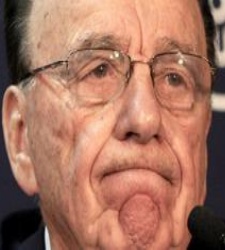
Rebekah Brooks, former chief executive of News Corp's British newspaper arm News International, was released on bail early Monday after being questioned over the phone-hacking scandal, the Metropolitan police said in a statement Monday.
"At approximately midnight, the woman was bailed to return to a London police station on a date in late October," the police said in the statement.
Police earlier had arrested the 43-year-old Brooks as part of an investigation into allegations of illegal voicemail interception and police bribery.
Brooks, who has denied knowing about the alleged hacking cases, resigned over the allegations at News International's News of the World tabloid, the paper she edited at the time some of the worst offences were alleged to have happened.
Police chief quits over hacking scandal
ritain's top police chief resigned and the former head of Rupert Murdoch's UK newspaper business was arrested on Sunday over a phone-hacking scandal that is lapping at Prime Minister David Cameron's door.
Analysts said the gathering pace of heads rolling had turned up the heat on Cameron and Murdoch over their handling of the scandal, with the media tycoon due to be questioned by parliament in a possible showdown on Tuesday.
Paul Stephenson, London's police commissioner, quit in the face of allegations that police officers had accepted money from Murdoch's News of the World paper and not done enough to investigate hacking charges that surfaced as far back as 2005.
The trigger for his resignation was revelations he had stayed at a luxury spa at which Neil Wallis, a former News of the World deputy editor, was a public relations adviser. Wallis, also employed by police as a consultant, was arrested last week in connection with the hacking scandal.
"I had no knowledge of the extent of this disgraceful practice (of phone-hacking)," Stephenson said in a televised statement, referring to allegations that thousands of phones, including that of a murdered schoolgirl, had been hacked into.
Stephenson's resignation and the arrest of Rebekah Brooks, one of Murdoch's top lieutenants until last week, were the latest twists in a scandal that has tainted police and politicians and shaken the tycoon's global media empire.
Several sources familiar with the situation said Brooks, 43, was being questioned as part of an investigation into allegations of illegal voicemail interception and police bribery at the News of the World tabloid she once edited.
Brooks quit on Friday as chief executive of News International, the British unit of Murdoch's News Corp, but has denied she knew of the alleged widespread nature of the phone-hacking.
The scandal has shocked the public and raised concerns not only about unethical media practices but about the influence Murdoch has wielded over British leaders and allegations of cosy relationships between some of his journalists and police.
With politicians from Australia to the United States demanding to know if similar abuses occurred elsewhere in Murdoch's global media business, the 80-year-old has been forced on the defensive and the position of his son James as heir-apparent has been called into question.
Murdoch was forced to drop a $12 billion (7 billion pounds) plan to buy all of highly profitable broadcaster BSkyB.
Cameron has come under fire for his friendship with Brooks and for employing former News of the World editor Andy Coulson as his press secretary after Coulson quit the paper in 2007 following the jailing of a reporter for phone-hacking.
Tim Bale, politics professor at the University of Sussex, said: "It has become almost a crisis of governance in the United Kingdom. (Stephenson's) resignation takes us beyond a few bad apples ... There is a sense of things sliding out of control.
"The actual text of (Stephenson's) statement pointing to parallels between himself and the prime minister is quite breathtaking. It won't make Mr Cameron do the same thing, but it reminds people once again of the Coulson problem."
Wyn Grant, professor of politics at Warwick University, said: "I don't think this is a crisis that is going to bring down the government.
"Clearly Cameron has made errors of judgement in this whole matter, and he is going to suffer some reputational damage, but there is nothing he has done that has been revealed so far that would require him to stand down."
Underlining Cameron's discomfort, opposition Labour Party leader Ed Miliband -- previously largely unable to score points off the prime minister -- has made the running on the scandal, analysts said.